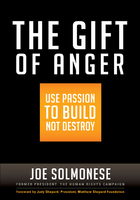
第1章 FOREWORD
My son, Matthew Shepard, was murdered in 1998 in Laramie, Wyoming, simply because of his sexual orientation. He was a caring and selfless young gay man with a bright future. His death brought to the public's attention the horror of violence based on sexual orientation. I was determined that Matt's life and death should have a more lasting meaning. Soon after Matt's death, my husband, Dennis, and I started the Matthew Shepard Foundation, and we have since devoted our lives to ending hate-based violence and passing federal legislation that offers greater protection to LGBTI Americans who find themselves victims of senseless violence.
The process of passing a major piece of legislation was daunting, and the resistance we faced in Congress both surprised and angered us. Yet Dennis and I persevered, working closely with the Human Rights Campaign (HRC) and its visionary leader, Elizabeth Birch. The partnership gave us great hope, support, and the will to carry on. When Elizabeth left her post at HRC, we wondered about the future and what it would mean to our important work. But when Joe Solmonese took the helm, we knew that we had a strong, empathetic, strategic leader and, ultimately, a good friend for life. Dennis and I felt immediately comfortable and confident in Joe. Calm and poised, he had an aura of competence and clarity about the path forward. Confident that this legislation was something we could accomplish, Joe never took his eyes off that goal-not for one day. While he took the work very seriously, he never took himself or his position too seriously.
Some people felt that Joe appeared too focused on the work, on the details of the plan, rather than on expressing his anger, given the gravity of the work. As an introvert, I think his disposition drew us closer. While I had more than enough reason to express my anger as I walked through the halls of Congress, I knew that to do so would likely keep us from accomplishing our goal. I would be lowering myself to the most base of reactionary behavior, and that was something I was unwilling to do. So I kept my anger in check. Recently I was surprised to learn from Joe that it was I, more than anyone, who had inspired him to channel his anger in ways that led to greater effectiveness and, ultimately, to write this book. I had never thought of it that way, but when I reflected back on the many difficult conversations I'd had over the years, the endless insulting, misguided, and erroneous things I had to listen to about our mission, I realized that I too had learned to channel my anger in a way that would create a lasting legacy for my son. With Joe's guidance, patience, and help, the Matthew Shepard and James Byrd Jr. Hate Crimes Prevention Act (HCPA) was passed and signed into law by President Barack Obama October 29, 2009. This legislation has helped millions of people live free from the hate-based violence that our family faced.
Today I consider Joe part of my family. He has been a blessing for me. He navigated the difficult world he found himself in, took the anger he felt at the injustices we faced, and became a thoughtful creator and leader of transformative and lasting change. We all have something to learn from him. I learned from Joe that politics, and accomplishing real change, is a tough and sometimes ugly business. I respect that Joe handled it with such grace. The fact that he is forthright and upfront with people is important and aligns with how I feel about the work that the Matthew Shepard Foundation accomplishes. The Gift of Anger brilliantly connects Joe's unique experiences with life lessons that anyone can use. I love his no-nonsense approach to finding common ground and to creating alliances for mutually beneficial results. More important, Joe understands how people think. He shares his perspective on how to get the most positive outcomes in difficult situations. Joe's ability to take the long view is anything but effortless, yet readers will find, as I have, that with careful attention, anything is possible.
-Judy Shepard
May 2016